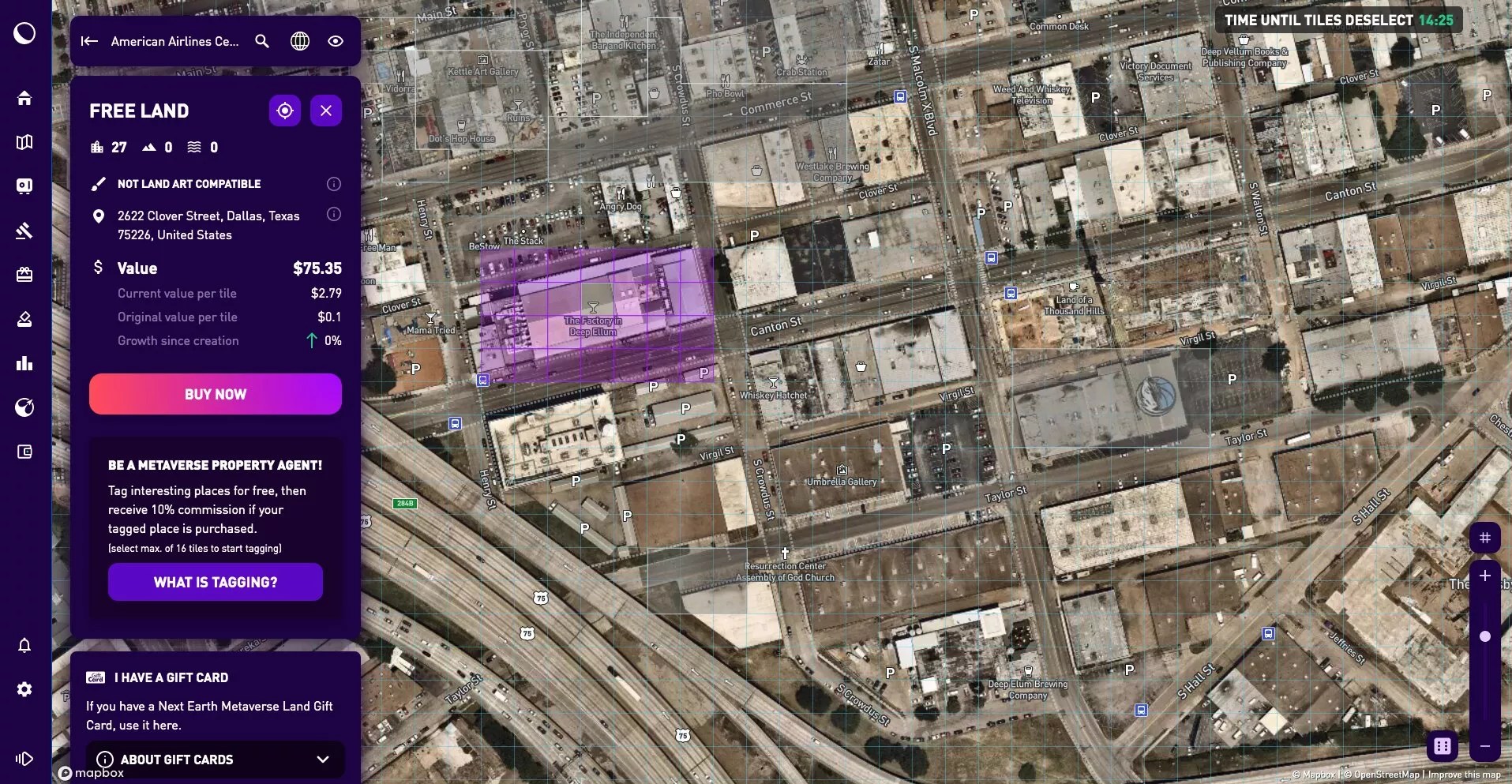
Screenshot from Next Earth

Audio By Carbonatix
The lines between the metaverse and the physical world continue to get blurrier. There’s an ongoing dispute about how matters of crypto currencies should be litigated, but now we are at an even more mind-boggling crossroad. Anybody who has access to the internet around the world can now purchase digital Dallas land and real estate in the metaverse by using Next Earth, an Earth-based metaverse that is a complete digital version of the world map.
The map looks similar to how the map on Google Earth or Google Maps street view would look as you scroll across the top of the American Airlines Center, Deep Ellum or your own home.
Next Earth is a metaverse platform that aims to create a fair digital life for everyone through the power of web3 and artificial intelligence. With more than 47,000 landowners and 303,000 registered users, Next Earth surpasses metaverse platform competitors like Sandbox and Decentraland.
The platform has four main pillars: economy, population, environment and governance, framed by an Earth-based metaverse. Users can buy virtual land as NFTs, which can be connected to their web2 businesses or used to build applications using the Next Earth Operating System. The platform’s native currency is NXTT, which is used for land purchases, long-term token holding and fueling its complex ecosystem The platform also has a launchpad for startups to launch their tokens within the Next Earth economy.
“The whole point of creating Next Earth is for us to create a fair digital life for consumers, which means ownership and agency over their data,” David Taylor, co-founder and chief product officer for Next Earth says. “Geo-data is a very important aspect of the land, and that is where the landowners come in. So everybody who bought land on Next Earth, we are providing them more and more tools and things like resources, different entities they can create to basically fill their land with data.
“Then location-based businesses can access that data and when those become monetized those land owners get paid. It is the same logic as if you would get paid by Facebook for them using your data.”
Landowners can also generate revenue by selling or renting their land or property for digital development projects like NFT art, online-business operations and future augmented-reality or virtual reality experiences.
For example, If Mark Cuban wanted to create a virtual reality experience by using the American Airlines Center on the Next Earth platform, he would need to purchase the land tiles where the American Airlines Center sits in order to do so, and he would need to buy it from someone because the arena has had an owner since August 2021. The first person purchased the arena for about $13 and the current owner purchased it for over $11,000.
“Virtual land is becoming the new Facebook business page.” – David Taylor
People can purchase their old school or university, their favorite bar, a house on White Rock Lake or a 20-acre ranch outside Dallas city limits. But don’t limit yourself. The Pyramid of Giza can be purchased from the current owner for around $1,300.
The value of properties is steadily increasing as users, landowners and NXTT investors continue to flood Next Earth’s world map and the countless opportunities that are waiting inside the metaverse. Game developers, real-estate agents, marketing teams, airline companies, professional sports teams, popular restaurants and everyday consumers are all welcome to build out their ideas and experiences on Next Earth, and it’s only a matter of time before the physical world and the metaverse co-exist seamlessly.
Maybe all the Erykah Badu birthday bash tickets will be sold out at The Factory, but there could still be 3D virtual reality tickets available for purchase in the metaverse. So you would still be able to go to Deep Ellum in the metaverse, skip the line, save money on drinks and still have an experience. Or maybe you are in Dallas and want to attend the Virgil Abloh fashion week tribute held by Louis Vuitton in Europe. You will just be able to attend in the metaverse.
Next Earth also offers a work-to-earn system that allows users to earn rewards or money by completing various tasks. This includes participating in community events, contributing to the platform’s development or performing specific tasks for other users. Users can also stake their NXTT tokens and earn rewards for helping to secure the network.
Another key feature of Next Earth is the Land Art program. This program encourages artists to create unique pieces of digital art that can be displayed on virtual land throughout the platform. Landowners can then display this art on their own land, making it a unique and personalized experience for each user.
The platform has a robust marketplace where users can buy and sell digital assets, including land, NFTs, and other items created within the Next Earth ecosystem.
Overall, Next Earth is a comprehensive web3 metaverse platform that aims to put the consumer back in control of their data through the power of web3 and AI. With its focus on economy, population, environment and governance, Next Earth offers a unique and holistic approach to creating a virtual world that is accessible and inclusive.
“Virtual land is becoming the new Facebook business page,” Taylor says.